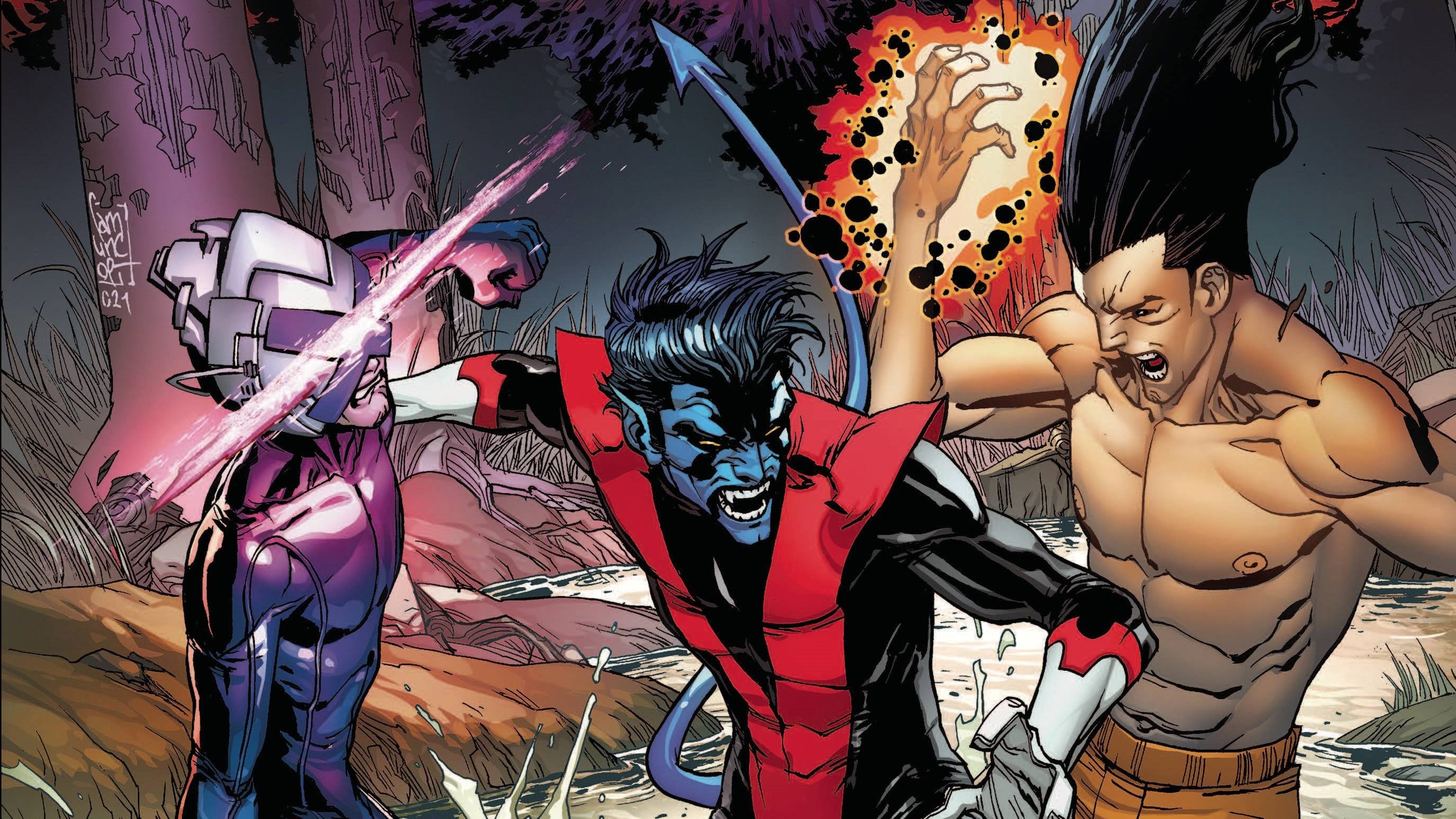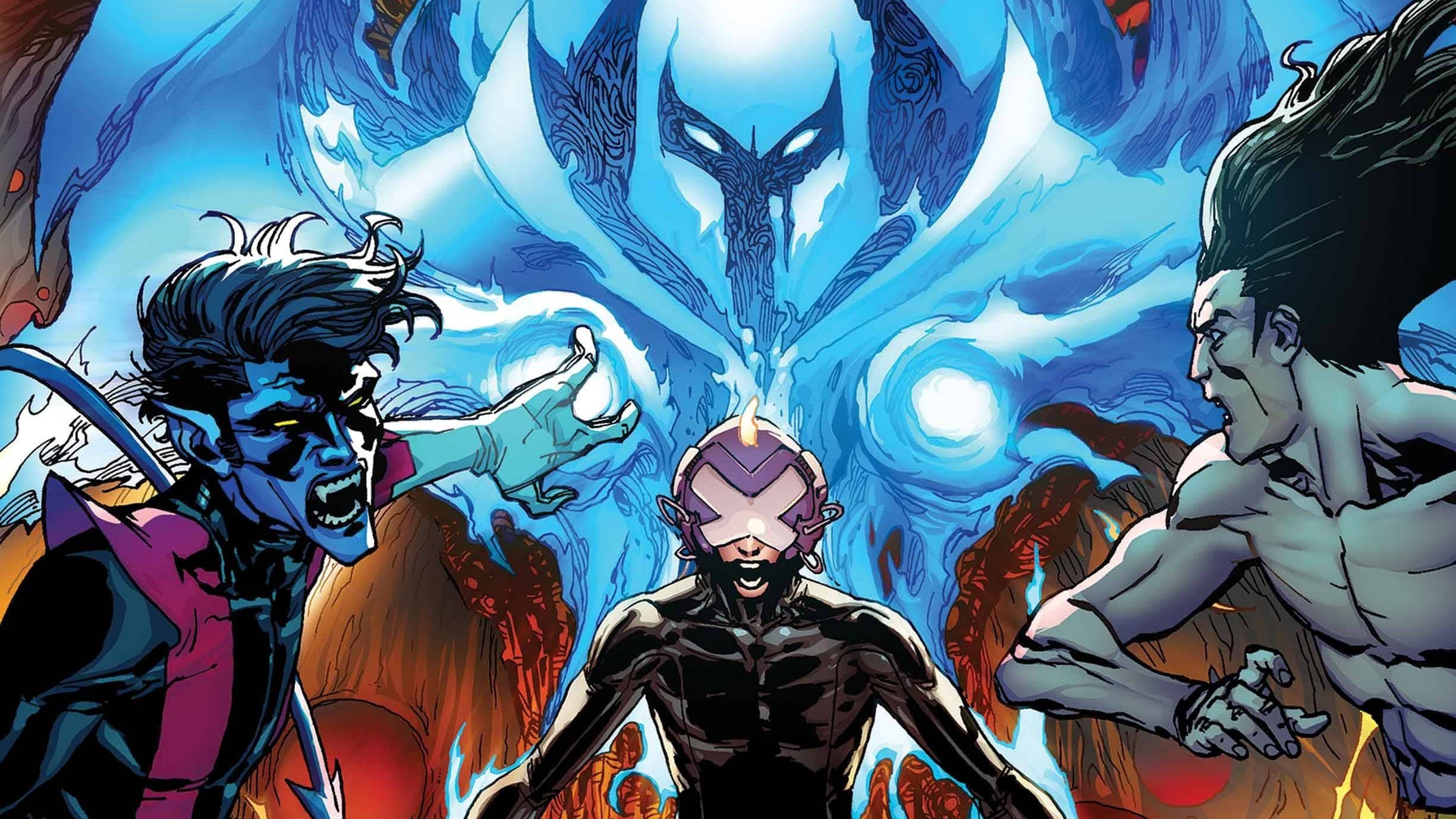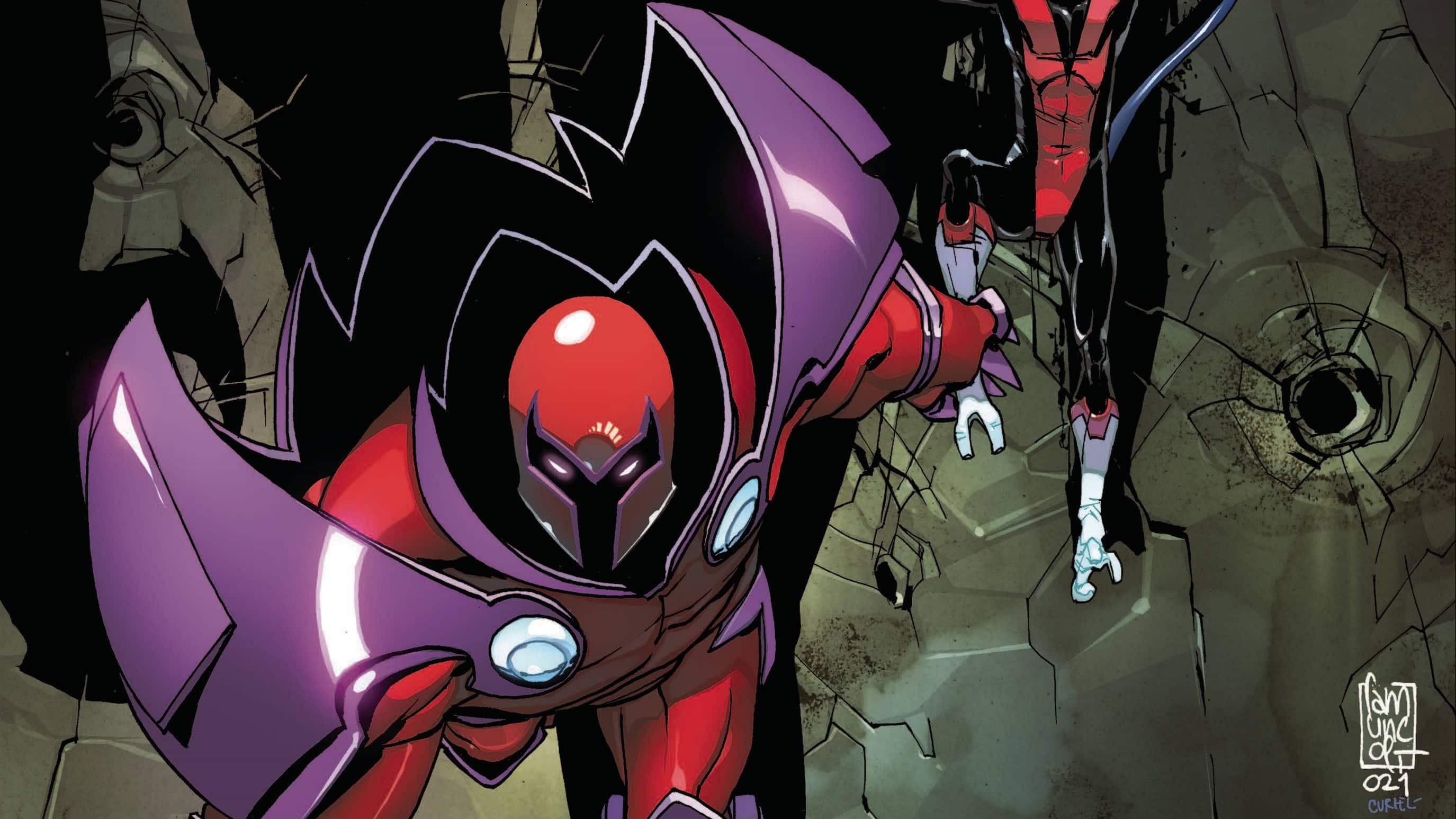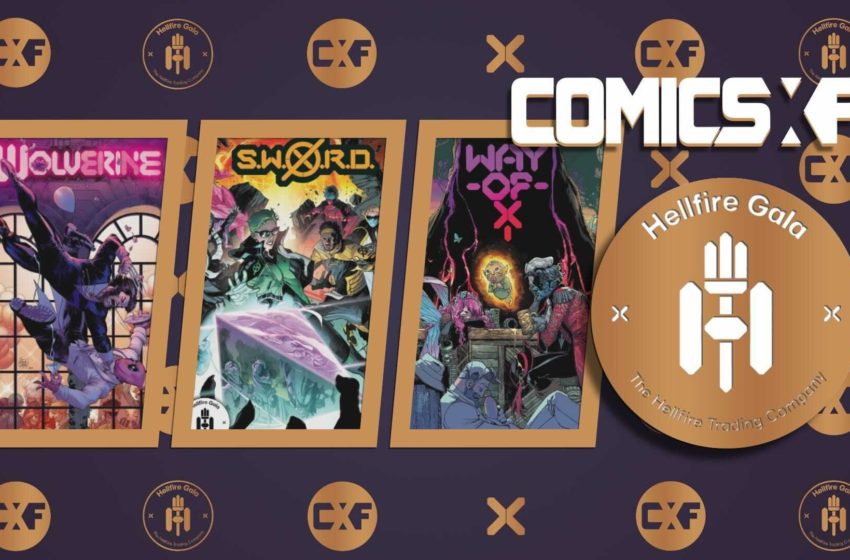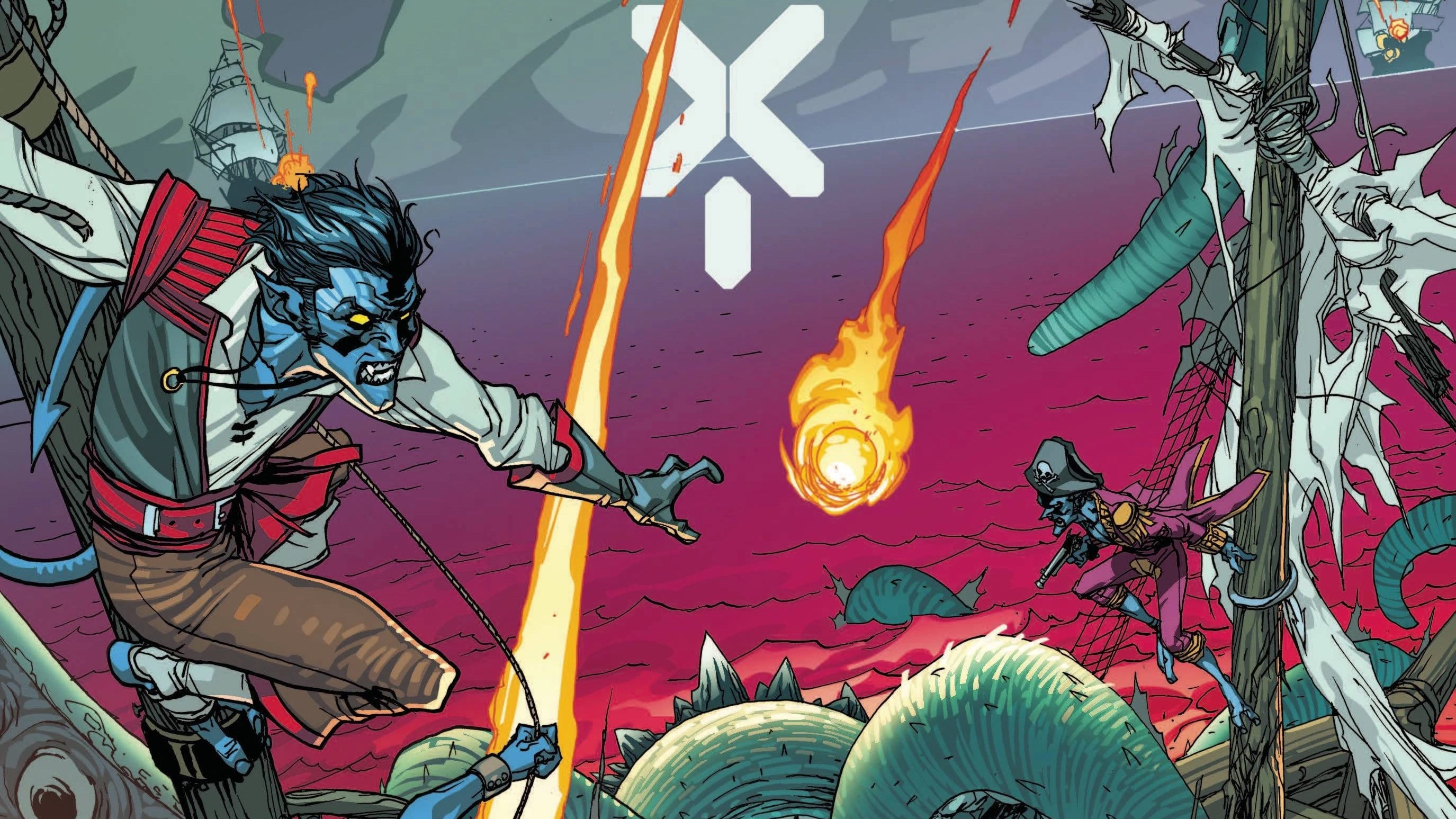There are snakes in the garden of Eden, a monster manipulating Krakoa. Nightcrawler continues to explore the mystery of the island in Way of X #4 by Si Spurrier, Bob Quinn, Java Tartaglia and Clayton Cowles.
Jude: The last issue of Way of X …happened. It was a lot, a lot that both Anna and I did not appreciate at all. But this is not the last issue. This is this issue. Do I forgive and forget? Are good works today absolution enough for missteps in the past? Do actions have long lasting consequences? These aren’t just questions I’m asking of Way of X; these are questions Way of X asks of its characters and maybe even itself. I have a lot to say about this, so I’ll cut my preamble here. Anna, how are you feeling about things?
Anna: This issue was fine. There was even stuff I liked! I’d be very happy to make this the new #3 and pretend the previous issue never happened. I want to love comics—especially comics starring Nightcrawler, and even more especially comics starring Nightcrawler in which he gets covered in pink ice cream. But WoX #3 casts a long shadow, and will continue to do so unless or until some of the things that were said and done there get properly worked through.
But for now – this is a new issue, with new stuff and questions and lots of skeletons (literal and metaphorical). Let’s get to digging.
Stories Must Have Endings

Jude: The story Lost tells is very much on the nose: a parable about wanting revenge, earning revenge, and being deprived of revenge for the greater good of society. This isn’t just about her lived experience (or what we assume is her lived experience – she never confirms or denies if it is); this is about Krakoa: killers, thieves, and racists get a new start (save Sabertooth). This is how society, even human society, works: we are a nation of laws, not men, remember. And yet maybe it should be the reverse; maybe people have a right to self-determination, even if it includes vengeance.
As thoughtful as that parable is (despite being a bit too on the nose), I have two issues with how it’s told. First: A Black character (or non-white character) telling a tribal story is just about as stereotypical as the “Black character from the hood” trope. That’s annoying, but the bar is on the ground coming from last week, so whatever.
Second: In this parable, my heart says the victim deserves retribution. I understand being hurt, and then being told that exacting revenge on those who hurt you isn’t palpable. I’m not the only one who gets this. Thing is, everyone thinks they’re the victim. Everyone thinks their vengeance is valid. And if you let people act on those base impulses, society comes crashing down. Does Kurt see this? Does Legion care? Does Lost have the nuance to understand? Who knows? I’m probably a few steps ahead of the text here.
Still, it’s good that I can read and critique with only a nominal level of indignation. Progress, right?
Anyway, thoughts?
Anna: I was similarly unsure how to feel about the decision to write and illustrate Lost’s story as a sci-fi tribalist fable. But this trope is much bigger than one story, and this comic keeps everything fantastical and vague enough that there’s no specific thing being appropriated. I also get the in-story reason: she needs a fantasy frame to work through her trauma. Still, I would have preferred to get a glimpse of Marinette’s actual life and history, which could have helped us get to know her better.
Jude: Amen!
Anna: While I’m glad we’re continuing to learn more about her, it’s unfortunate that choosing this frame effectively means she remains more symbolic than real.
I also want to talk about Dust, who makes a brief but breathtaking cameo taming the sand tides of Arakko that the Omegas apparently failed to consider. Seeing Sooraya here, taking no guff and being awesome as hell, made me wish she was the star of this book. I would dearly love to give all my money to a comic about Sooraya’s life on Krakoa, centering her perspective, written by someone with an affinity for her experience.
There is, of course, potential to use Kurt to have complex conversations related to intersections of culture, ethnicity, race, sexuality, gender, and religion. But doing so would require making better use of his intersectional identities – the fact he’s Catholic and a visibly different mutant and a sexually charged romantic raised in a German circus by a pagan Romani sorceress. There have been times in this series where it’s felt, to me, like Kurt’s being defined solely by his religion in ways that read as strange and simplistic, especially since we actually know very little about the nature of his faith. Even when Kurt became a priest, it happened in a time jump, the details of which have never been filled in.
Crises of faith are worthwhile stories to tell, identifiable to so many. But we don’t know why Kurt became a priest, or why he apparently is one again. We also don’t know which branch of Catholicism he follows. German Catholicism and American Catholicism are different in important ways, and we didn’t need President Biden being threatened with excommunication to know there’s little unity among American Catholics, either. The ways Kurt was demonstrably out of character in the previous issue compounds the problem. We’re four issues in, and I’m not really sure who this Kurt Wagner is. I understand that’s partly intentional – Kurt doesn’t know who he is either, and is trying to figure it out. But I’m still struggling with the exact nature of his internal conflicts, since little of Kurt’s established continuity seems to count toward this portrayal. Stories need endings; I’d argue they also need recognizable beginnings.
Where Lies the Sin

Jude: So after X of Swords and really after X-Men #4 (when our boy slaughters the humans who were coming to kill Xavier, Magneto, and Apocalypse, and Magneto gives an amazing speech on capitalism), Gorgon became one of my favorites. Soft spoken. Focused. Resolute. His death, more than any death I’ve seen thus far, felt earned, and I wondered if or how he would be resurrected.
Well, I wonder no more. Gorgon is back and he is…something else all together. Much like Rockslide, dying outside this dimension means his resurrection would be different. I originally assumed I’d get an even more hardened, evil killer psychopath. I instead got…this.
Sniveling. Crying. Weakened.
Maybe actions have consequences. Maybe all the murder and killing meant Gorgon had to come back in a manner that made him more analogous to his victims than to a villain. I found myself sad for him. But the story isn’t really about him. The story is about the second (or third, depending if you consider Fenris one or two people) worst mutant alive: Fabian Fucking Cortez. In Central Park, Fabian is using his boost powers to make Gorgon feel the fear and hatred from those around him. And that fear and hatred, bubbling and bubbling in his head, is about to break. Will Gorgon turn half of New York into stone? Will Kurt have to kill to save people?
Of course not. How did you feel about our boy’s resolution to this endeavor?
Anna: I’m going to do some good old fashioned griping about superhero fight mechanics! Kurt’s teleportation should be virtually instantaneous, and Pixie said back in issue #2 that he can teleport “crazy far” these days. So why didn’t he just teleport Gorgon away from the crowd?
Jude: Amen!
Anna: Sure, I can come up with a bunch of No-Prize reasons he didn’t do it. Maybe it would have startled Gordon, and made him lash out. Maybe Kurt couldn’t think of a safe place to teleport him. Maybe he wanted to make a point. I’m not sure, but without explanation, it feels like Kurt just… forgot he’s specifically great at taking people from one place to another, in an instant, just by thinking about it? This didn’t feel like a particularly well planned logic trap for a person with Kurt’s powerset. Ah well.
Besides that, I mostly liked this scene. I think it was a little drawn-out for what it was, since it was basically a pretty generic “villain challenges the moral compass of our hero” thing, and Kurt’s been threatened by experts. But Kurt turning himself into a comedy spectacle to solve the problem was fine. That’s the best I can do. It was fine. I’m not quite ready for Kurt to be goofily loveable again, after everything.
Jude: Personally, I liked the scene, even if the resolution felt tonally out of place. Yes, making a fool of oneself tends to disarm aggressors (at the cost of pride – see: Stepin Fetchit, et al). And sure, doing what is necessary for the greater good is, generally, a good thing. But actions (should) have consequences, and a stern talking to from Nightcrawler isn’t quite the consequence I think he deserves.
Small digression here: it appears that Kurt is going to make Fabian talk to Lost. This is reminiscent of a conflict resolution method used in schools called “Restorative Justice,” where all parties sit down and talk through the issue. There’s a lot to it (ergo the link), but one of the more important parts of this process is agency and consent from the victim. The victim has to want this; has to initiate it; has to be centered in it. And I hope that Lost will get to affirm that she is ready to be healed; that she wants to face the person who (we assume!) hurt her.
And I fear she, again, will not be given agency, and will, again, be objectified so the larger plot can move forward. I hope I’m wrong.
I doubt I am.
Anna: I think Kurt proposing that Cortez and Lost “talk it out” is probably in character for him. But much as I love him, he is not always right. Truth and reconciliation can be a very valuable thing. But there’s a zero percent chance of Cortez being repentant. Which means it’s potentially setting Lost up to be re-traumatized without any clear gain? Making a Black woman try to find common ground with the fascist who murdered her family (assuming that’s where we’re going with this), doesn’t sit well with me.
Jude: Amen!
Anna: I hope we’re both wrong about how it goes.
I Just Don’t Know Why

Jude: Finally, let’s talk Legion. David set up a meeting with his dad, the enigmatic Professor X, to get a Krakoan seed. The meeting is filled with heightened drama: not just because of family tension, but because the spectre of Onslaught is psychically raising the tension of all those in the room. Why isn’t this working on Legion and Professor X and Xorn/Zorn? Good question!
We haven’t talked much about the art here, but I liked how the red was used to show people’s passions taking them over – simple, yes, but effective. And! It was heartening to hear David loves his father even though, notably, Xavier doesn’t return the emotion – on brand for a megalomaniac manipulator. And! As we talk about consent, look at how Xavier doesn’t ask for it; look at the result; look at actions having consequences, as Legion and Xorn/Zorn obliterate everyone to save everything.
All of this worked really well for me though, for someone always written as unbalanced, Legion sure has sounded like the only one with sense this entire run. Maybe he, not Kurt, is the real narrator. Or maybe Spurrier is using him as his voice in this issue, as he used Dr. Nemesis last issue. Who knows? What did you think, Anna?
Anna: I think Spurrier is better at writing Legion than Nightcrawler and I kind of wish they’d just let him have a Legion book instead… But I digress.
Jude: Amen!
Anna: Yeah, I liked this scene. And I thought this was the line of the book: “It’s worse than that, Dad. I love you. I just don’t know why.” It’s great because it hits on multiple levels. Maybe Legion loves Xavier for the simple reason that he’s his dad, and he can’t help it. But given all the mental manipulation going on, with Onslaught, within the resurrection protocols, and maybe more, I also read into it a suggestion that Legion is being compelled to love Xavier. Which is at once chilling and utterly heartbreaking, for both father and son. Ditto with Legion’s decision to embrace death should he ever lose control again.
I’ll also contribute to the art discussion and say the nine-panel grid pages were well done. This type of dense, deliberate, symmetrical layout, codified by Watchmen, is ideal for thoughtful pacing and juxtapositions, and we saw that here. On the first nine-panel page, the back-and-forth between Xavier and Legion serves a compare-contrast function which is further enhanced by the colors, Xavier’s panels being cold and gray while Legion’s are rendered in warmer earth tones. On the second page, we get an effective build to the bar fight, with the red reaction panels woven through Legion and Xavier’s ongoing psychic conversation. The symmetry emphasizes the way everything is connected, but programmatically; everyone, including the reader, is caught in a pattern they can’t escape, where you can see the ending, but can’t prevent it.
One last thing from this scene, about Dazzler. So I guess she and Nemesis are continuing to hang out? Nemesis making a single rote apology should not be enough to make up for cruelly insulting Allison on numerous occasions – especially when we’re talking about a woman with considerable misogynistic abuse in her past. It’s going to take a lot more to sell me on this development.
Jude: I actively hate Nemesis and Dazzler for the exact reasons you mentioned. Again, actions should have consequences, but it seems those consequences are not equitably doled out. Maybe that’s just art imitating life; I don’t like it either way.
In any case, at the end of this issue we see Legion and the Z/Xorn(s) using the seed (and, presumably, the cover from all of the dust storms – hi Sooraya!) to create what he calls a temple. Will it end up on one of the moons? How, exactly, will this temple give mutants the freedom of peace of mind?
All this and more, next time on DragonBall…err, I mean Way of X.
Again, I like this idea, and I’m curious as to how it will manifest. WoX is evidently about turning religious and faith conventions on their head; less so about maybe understanding and respecting those for whom those conventions have real life implications beyond comics. If anything, I’m not bored; I might argue I’m thinking too much, too deeply about what I’ve seen here. And given some other comics I’ve reviewed, that’s a good problem to have.
So, does what I’ve read absolve what we tore down last week? Absolutely…not. Absolution and forgiveness require an honest acknowledgment by the aggressor that they were wrong. Absolution requires the aggressor to ask for forgiveness. Neither was done here. I can’t simply live and let go. Maybe that makes me like the warrior in Lost’s parable. Maybe I need to let my angst slide for the greater good of the work.
Maybe all that is true. And maybe I don’t want to. Maybe I’ve earned the right to be self-righteous in how I dole out praise.
Maybe I’ll reserve the right to re-examine when everything’s said and done. But for now, as much as I appreciate the issue and the ideas, I’m still circumspect when it comes to the work and author. Yes, I liked this issue, but I haven’t forgotten or forgiven what happened last time…and I’m not sure I will.
Anna: I’d love to forgive and move on. But it’ll take time and trust. After the last issue, I wanted to look to my favorite hero for comfort, and couldn’t, because the story suggested he was never who I thought he was – that if he were real, he may even want to restrict my bodily autonomy. That’s not easy to forget, especially since we’re not yet sure which character beats are attributable to Onslaught, and which are the new status quo.
I fully realize different people had different reactions to WoX #3, grounded in their own experiences and needs. There’s no right way to read a story; anyone reviewing anything is just doing their best to explain their opinion.
I also know it’s just a comic. At any given second, there are many more important things going on in the world. But we’re writing this, and you’re reading it, because we all care deeply about silly made-up stories about mutants with blue fur and psychic powers making a new home on a living island. Even when we’re critical – it’s a testament to the power of these stories that we care enough to take them seriously.
X-Traneous Thoughts

- Gorgon crying made me tear up a bit. I really do appreciate him.
- Xavier sure does stutter a lot here. I can’t recall him ever doing so, not this regularly. (Notably, he doesn’t stutter at all when he forces himself upon David.) Is it merely supposed to signal discomfort in dealing with Legion, or something more?
- Kurt’s been stuttering a lot in this book, too. It is similarly very out of character. I’ve been assuming there’s some reason. Guess we’ll see.
- Pretty sure the word blocked out of Nemesis’ field notes was “dick”. If not, it should be. Also, Cortez should be punched more.
- Cortez’ line about starting holy wars? Being present in both SWORD and Way of X as a hapless dick? I’m not a gambler, but I’m betting on Cortez contributing to Wanda’s death in some way, shape, or form.
- I like the cover. Kurt looks nice on it. Sometimes, I’m a woman of simple pleasures.
- I also enjoyed the scene where Marinette was watching Sooraya’s sandstorm. Quinn did a lovely job rendering it, and seeing Marinette’s intrigue and longing, I had a strong desire for them to become fast friends and leave all these dudes trying to solve all the problems of other dudes behind in the… well, dust.
- This is a bit random and an issue behind, but I forgot to mention in the last write-up that I think, depending on comics timelines that are iffy at the best of times, Kurt could technically be the father of Meggan’s child? X-Factor characters made reference to the events of “Age of X-Man,” so that continuity should count. While I actually enjoyed the Kurt/Meggan story in “Age of X-Man” in an outside-of-continuity “What If…?” sense, I definitely don’t want Meggan to be pregnant from events in a world where she and Kurt were brainwashed.
- Krakoan Reads: This Sacred Land

